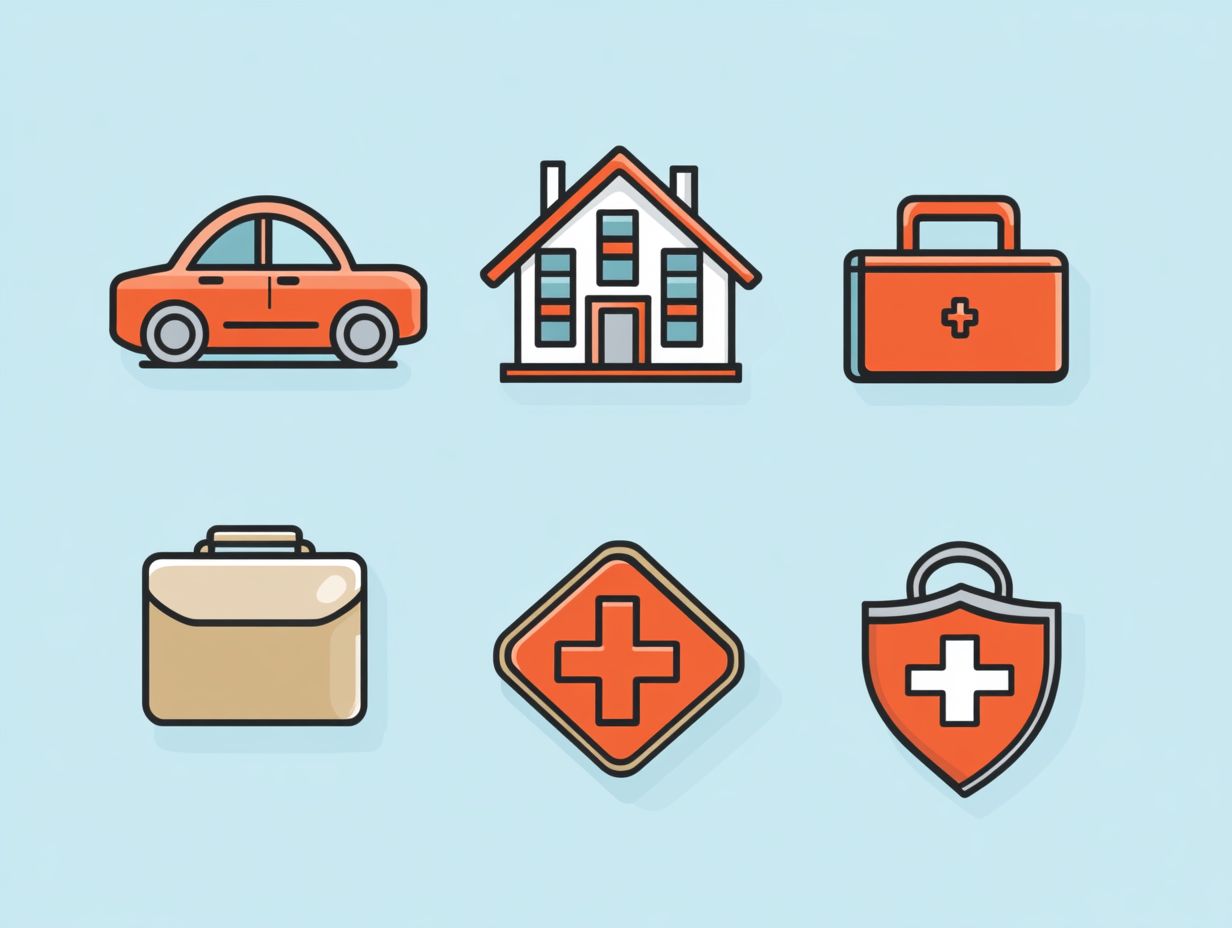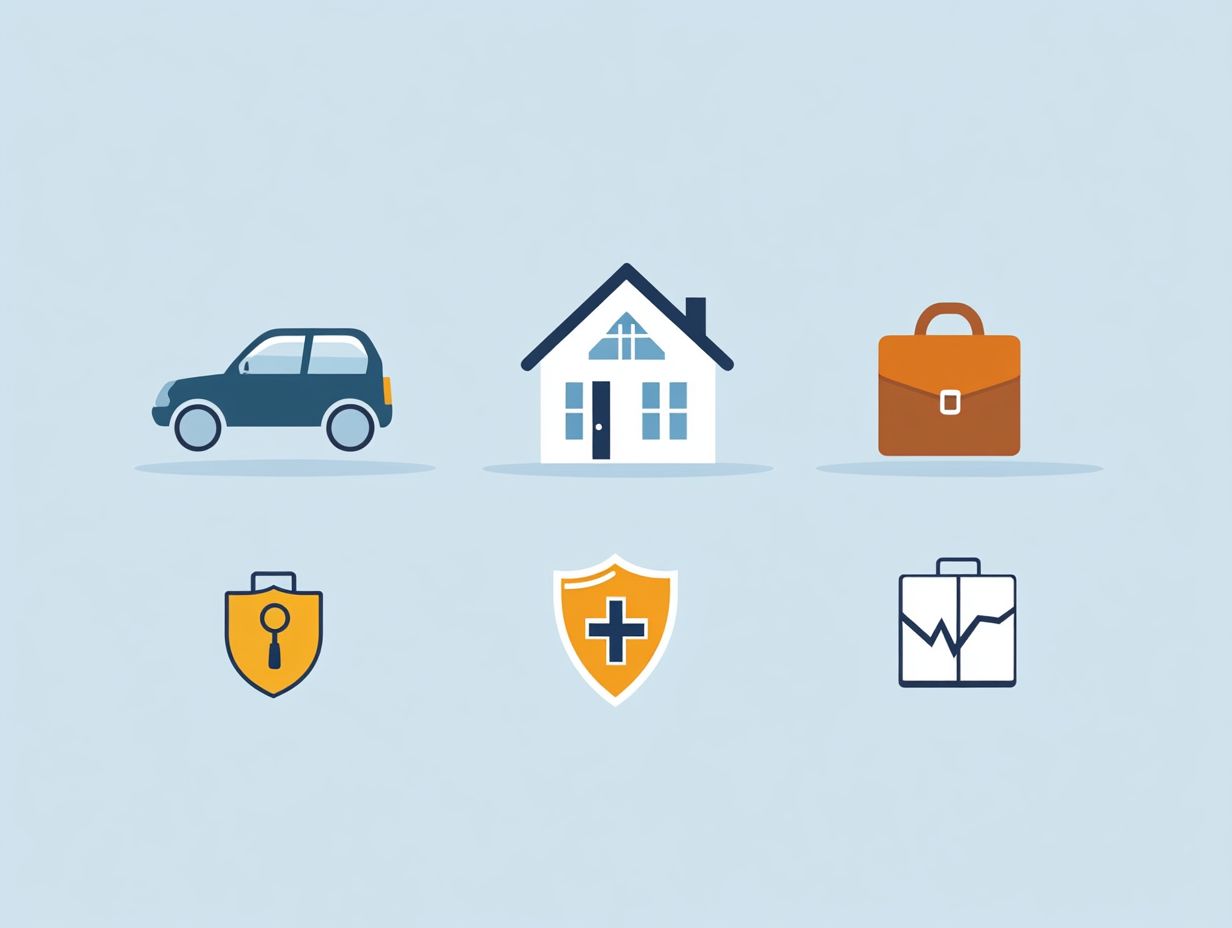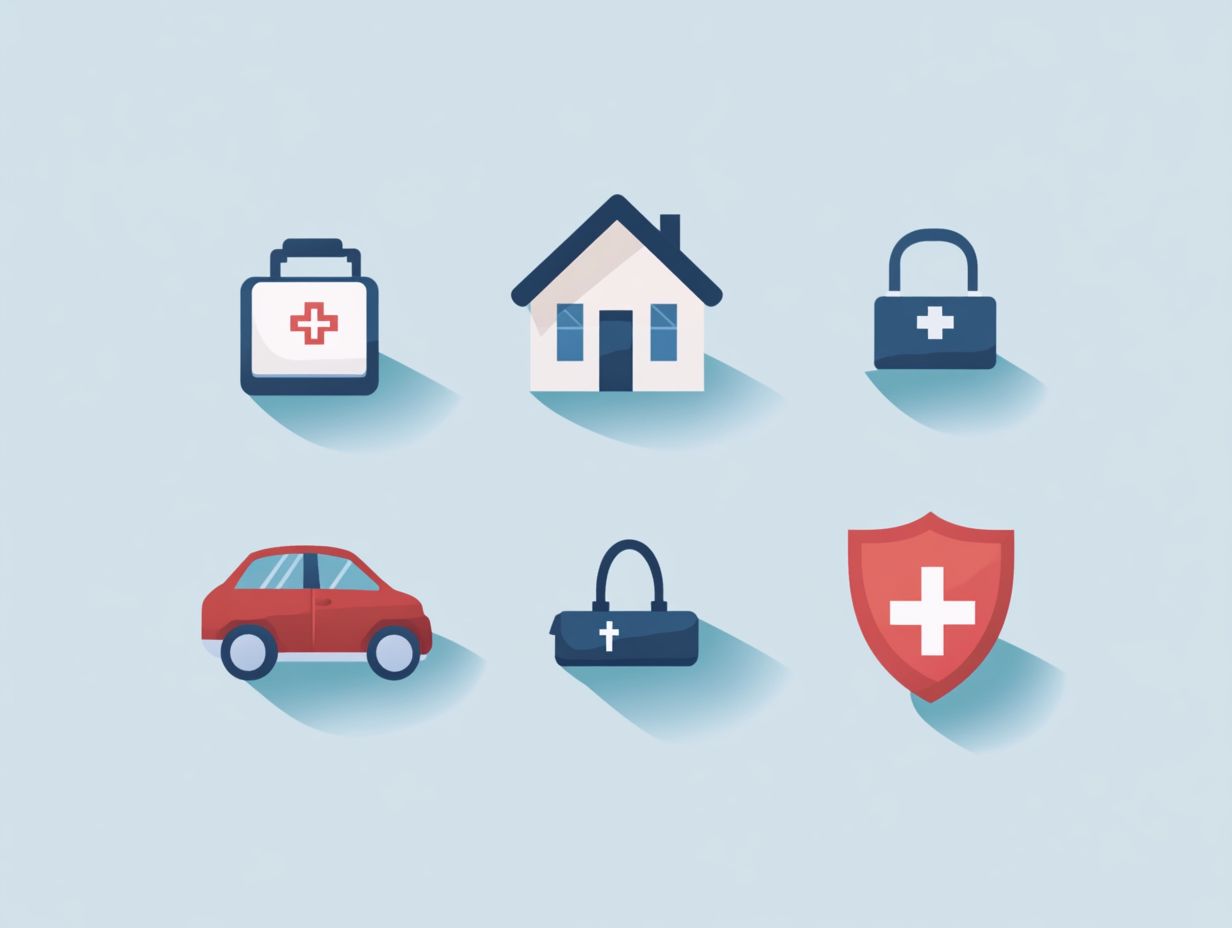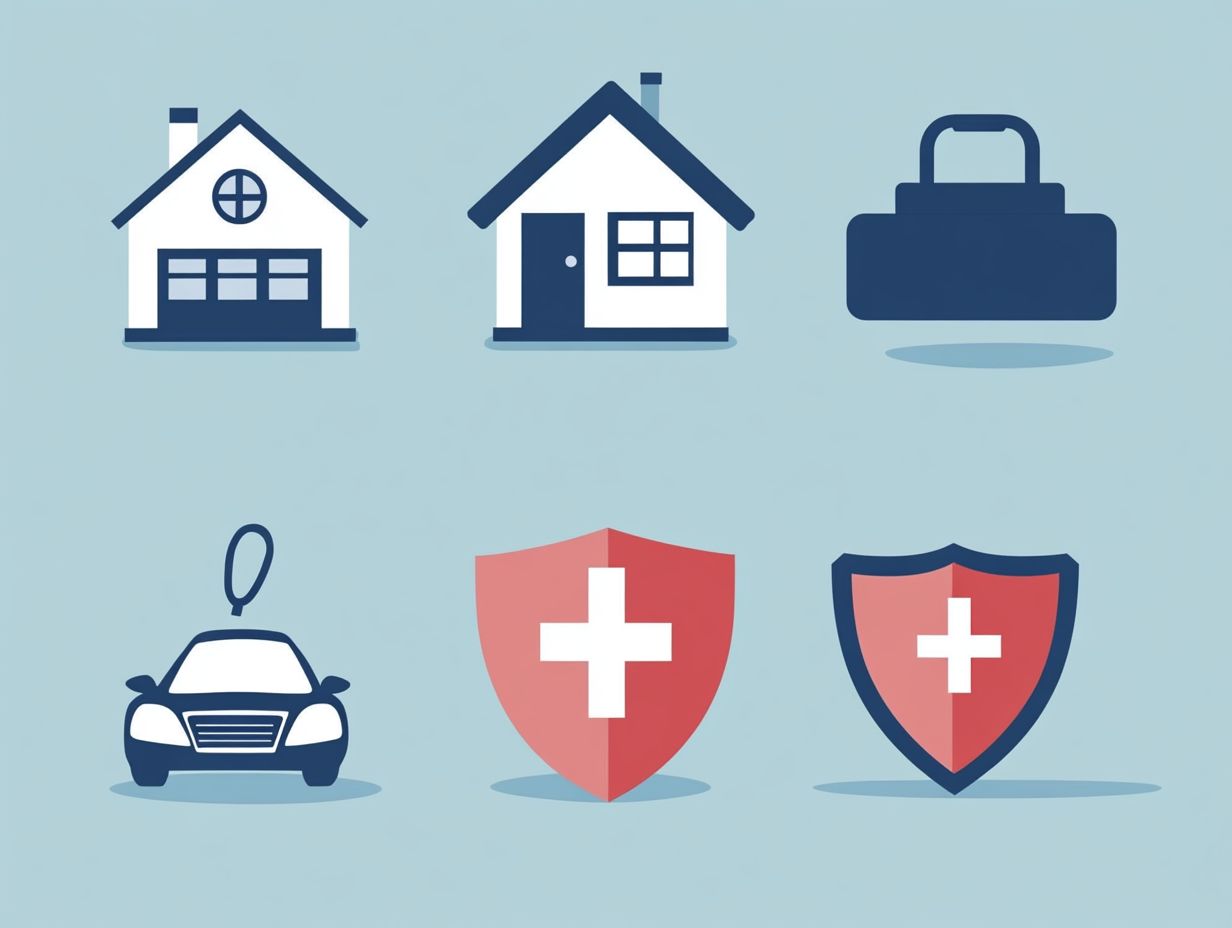5 Types of Coverage You May Need
Protect what matters most to you today with the right insurance! Navigating the world of insurance might seem daunting, but understanding the different types of coverage is vital for safeguarding your health, home, and financial security.
From protecting your health and home to ensuring your financial security, the right insurance offers invaluable peace of mind.
This article delves into five essential types of insurance health, homeowners or renters, auto, life, and disability. We will explore their significance and the key factors you should consider when selecting coverage.
You will also learn about common pitfalls and additional options that may be worth considering. By the end, you’ll be well-equipped to make informed decisions about your insurance needs.
Contents
- Key Takeaways:
- 1. Health Insurance
- 2. Homeowners or Renters Insurance
- 3. Auto Insurance
- 4. Life Insurance
- 5. Disability Insurance
- What Is the Importance of Having Insurance Coverage?
- Frequently Asked Questions
- What are the 5 types of coverage I may need for my insurance policy?
- Why is liability coverage important?
- What does property coverage typically cover?
- Is health coverage necessary if I have health insurance through my employer?
- What is disability coverage and why do I need it?
- What does life coverage typically cover?
Key Takeaways:

Protect yourself and your loved ones with health insurance to cover medical expenses and ensure access to necessary healthcare services.
Homeowners or renters insurance can provide financial protection in case of damage to your property or personal belongings.
Auto insurance is essential for legal compliance and provides coverage for accidents, theft, and other unexpected events.
1. Health Insurance
Health insurance is an essential pillar of personal finance. It offers critical protection against unforeseen medical expenses and financial strain, especially in states like New Hampshire and Virginia, where healthcare costs can be quite high.
You have a variety of health insurance plans to choose from, including Health Maintenance Organizations (HMOs), Preferred Provider Organizations (PPOs), and high-deductible plans.
HMOs usually require you to select a primary care physician and obtain referrals for specialist visits. On the other hand, PPOs grant you more freedom in choosing your healthcare providers.
Having adequate medical coverage ensures timely access to necessary treatments and alleviates the financial stress that often accompanies health crises.
With the right plan in place, you can navigate medical emergencies with greater ease, helping to avoid the crippling debt that could jeopardize your future.
2. Homeowners or Renters Insurance
Homeowners or renters insurance is crucial for safeguarding your personal property. It also provides liability coverage, granting you peace of mind whether you own or rent your home.
Understanding the nuances between these types of insurance can be exceedingly beneficial. Homeowners insurance typically covers both the structure of your home and your personal belongings.
Renters insurance, in contrast, focuses solely on protecting your personal property. Liability coverage in both policies shields you from claims arising from injuries to others.
Homeowners insurance often offers more extensive coverage due to the additional risks tied to property ownership. Both types of insurance usually include provisions for additional living expenses, which can help cover temporary housing costs in the unfortunate event of damage.
This support proves invaluable during stressful times, allowing you to focus on what truly matters.
3. Auto Insurance
Auto insurance is essential for protecting you against financial losses stemming from accidents, theft, or damage. With options like collision insurance and comprehensive coverage, you can protect yourself effectively.
Understanding these various types of coverage is key to making informed decisions. Collision insurance takes care of repairs to your vehicle after an accident, regardless of fault.
Comprehensive insurance covers damages from non-collision events, like natural disasters or theft. Liability insurance is crucial, as it shields you from claims made by others injured in an accident.
When selecting car insurance, evaluate your unique requirements, such as your driving habits and the value of your vehicle. Also, keep in mind state regulations that may dictate minimum coverage levels.
Explore your insurance options today to secure your future!
4. Life Insurance

Life insurance serves as a safety net for families. It provides crucial support during unexpected losses.
You have various coverage options, including term and whole life insurance, as well as home insurance policies. Each is designed to meet your specific needs.
Term life insurance is budget-friendly, perfect for those seeking temporary coverage. Whole life insurance offers lifelong protection and builds cash value over time.
Choose the right policy to secure your financial future. Don’t leave your loved ones vulnerable to unexpected costs!
5. Disability Insurance
Disability insurance protects your income from events that could prevent you from working. It’s essential for financial peace of mind.
These policies are mainly short-term and long-term options. Short-term disability insurance provides a portion of lost wages for up to six months.
Long-term disability insurance offers extended coverage, sometimes lasting until retirement age. This ensures you have support during prolonged incapacitation.
Both types help you maintain your standard of living and reduce financial stress, allowing you to focus on recovery.
What Is the Importance of Having Insurance Coverage?
Comprehensive insurance coverage protects you from unexpected events that can cause financial stress. It’s your safety net for medical bills and property loss.
In today’s unpredictable world, various types of insurance are vital for peace of mind and financial stability.
- Health insurance eases overwhelming medical bills.
- Homeowners or renters insurance safeguards your belongings against theft or damage.
- Auto insurance covers vehicle repairs and protects you from personal injury claims.
- Life insurance ensures financial security for your loved ones after your passing.
Each product helps mitigate risks, enabling you to face life’s uncertainties with confidence.
What Factors Should Be Considered When Choosing Insurance Coverage?
Choosing the right insurance requires careful consideration of key factors, including coverage options, costs, and your specific financial needs.
Review your lifestyle. Your travel frequency and home activities can greatly influence your insurance requirements.
Understanding your financial landscape, such as income and savings, is crucial for determining how much you can afford in insurance costs.
Regional differences also matter; certain areas may have unique risks needing extra coverage. Conduct thorough research, compare policies, and consult a professional.
This way, you can make informed decisions tailored to your unique circumstances.
What Are the Risks of Not Having Adequate Insurance Coverage?

Not having adequate insurance coverage exposes you to substantial risks. These include overwhelming medical expenses, property loss, and liability claims that could lead to financial hardship for you and your family.
Consider this: an unexpected health crisis without proper health insurance can result in astronomical hospital bills. This may force you to dip into your savings or even rack up debt.
If a natural disaster damages your home and your policy lacks adequate coverage, you might find yourself footing the repair bill entirely out of pocket.
Without sufficient liability insurance, an accident could leave you vulnerable to lawsuits. This can drain your finances and put your assets at risk.
This ripple effect demonstrates how inadequate insurance doesn t just impact your immediate expenses. It also raises serious concerns about your long-term financial stability, ultimately affecting your future opportunities and peace of mind.
How Can One Determine the Right Amount of Coverage for Their Needs?
Determining the right amount of insurance coverage involves a detailed review of your personal financial needs, property values, and specific risks related to your lifestyle and location.
Start with a clear plan to protect what matters most. Begin with a thorough inventory of your personal belongings to understand their overall value and gauge the coverage necessary to protect your assets from potential loss or damage.
Evaluating potential liabilities such as those associated with homeownership or vehicle use will reveal areas where additional coverage might be advisable.
By comparing available policy options, you can find the best fit tailored to your unique circumstances and financial goals. This will ultimately lead to informed decisions that offer you peace of mind.
Avoid These Common Insurance Mistakes
Many individuals often stumble when selecting insurance coverage, typically due to a lack of understanding about their options. Insufficient research on premiums or failing to evaluate their actual needs can also be problematic.
These oversights can lead to costly consequences such as not having enough insurance, leaving you vulnerable in times of crisis, or overpaying for unnecessary add-ons that offer little value.
To navigate this complex landscape, carefully assess your unique circumstances and gather comprehensive information on various plans before committing to a decision.
Seeking guidance from trusted professionals or utilizing comparison tools can significantly enhance your ability to identify the most suitable coverage. This ensures you are well-protected without incurring excessive costs.
Additional Types of Beneficial Insurance Coverage
Along with your standard insurance policies, consider exploring additional types of home insurance for unique properties like umbrella insurance and long-term care insurance for that extra layer of protection.
Umbrella insurance provides an extended layer of liability coverage that goes beyond the limits of your typical home or auto policies. This means you re better protected against substantial claims or legal actions that could lead to significant financial loss.
With this coverage, you can feel secure knowing you re safeguarded against unforeseen incidents, whether they happen during a social gathering or while you re enjoying extracurricular activities.
Long-term care insurance becomes increasingly vital as you age. It covers costs related to medical care, nursing homes, or assisted living facilities that standard health insurance may not fully address.
Together, these supplemental policies can significantly enhance your existing coverage, enabling you to navigate potential risks and challenges with greater confidence.
Frequently Asked Questions

What are the 5 types of coverage I may need for my insurance policy?
- Liability coverage
- Property coverage
- Health coverage
- Disability coverage
- Life coverage
Don’t wait! Review your insurance coverage today to secure your future.
Why is liability coverage important?
Liability coverage is vital. It protects you financially if you cause damage or injury to someone else.
This coverage helps pay for legal fees, medical bills, and property damage.
What does property coverage typically cover?
Property coverage pays for damage to your belongings, like your home and car. It may also cover damages to other people’s property that you are responsible for.
Is health coverage necessary if I have health insurance through my employer?
You should still consider health coverage. It can cover deductibles, co-payments, and treatments not included in your employer’s plan.
What is disability coverage and why do I need it?
Disability coverage gives you financial help if you can’t work due to an injury or illness. It helps pay living expenses, medical bills, and replaces lost wages.
What does life coverage typically cover?
Life coverage, or life insurance, provides a death benefit to your beneficiaries if you pass away. This can help cover funeral costs, debts, and support for your loved ones.






